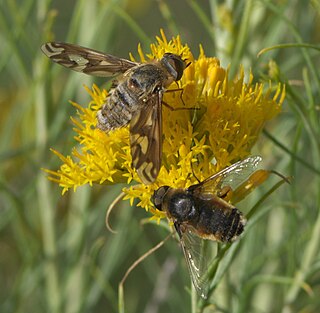
Poecilanthrax willistoni, Williston's bee fly or sand dune bee fly, is a member of the Bombyliidae insect family. This family includes the bee flies, true flies that have developed Batesian mimicry characteristics to avoid predators. That is, they look like bees because that helps them avoid bee-wary predators, but they lack stingers.

Hoplitis anthocopoides is a species in the family Megachilidae, in the order Hymenoptera . The distribution range of Hoplitis anthocopoides includes Africa, Europe, Northern Asia, and North America.
Brachinus texanus is a species of ground beetle in the genus Brachinus, in the family Carabidae . It is found in North America. Like other bombardier beetles, it can spray a boiling, corrosive liquid from its abdomen if provoked, and as such should not be handled.
Osmia glauca is a species in the genus Osmia, in the family Megachilidae . It is found in North America.
Calliopsis pugionis is a species of mining bee in the family Andrenidae. It is found in North America.

Diadasia bituberculata is a species of chimney bee in the family Apidae. It is found in Central America and North America.

Bombus vandykei, the Van Dyke's bumblebee, is a species of bumble bees in the family Apidae. It is found in North America.
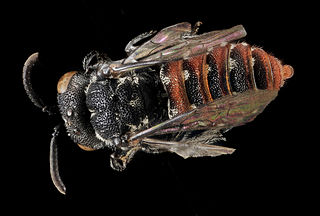
Holcopasites is a genus of cuckoo bees in the family Apidae. There are at least 20 described species in Holcopasites. They are uncommon and very small. Unlike all other genera of Apidae males of the species have 12 antennal segments instead of 13. In the most common, Eastern species, abdomens are red with bright white patches of hair.

Colletes latitarsis, the broad-footed cellophane bee, is a species of cellophane or plasterer, masked, and fork-tongued bees in the family Colletidae. It is found in North America.
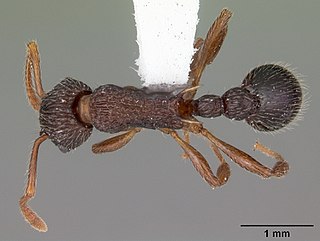
Myrmica punctiventris is a species of ant in the family Formicidae.

Coelioxys hunteri is a species of hymenopteran in the family Megachilidae.
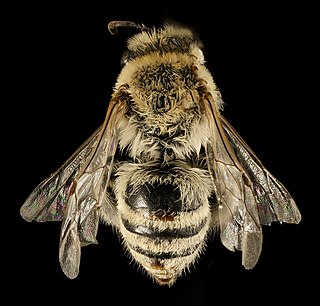
Colletes phaceliae is a species of hymenopteran in the family Colletidae. It is found in North America.
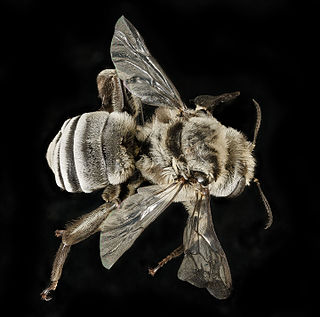
Melitoma is a genus of chimney bees in the family Apidae. There are about 13 described species in Melitoma. Found in the Nearctic and Neotropics.

Helochara communis, the bog leafhopper, is a species of sharpshooter in the family Cicadellidae. It has paired mycetomes within its abdomen, containing multiple symbionts.
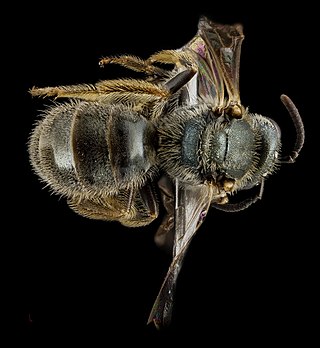
Lasioglossum floridanum is a species of sweat bee in the family Halictidae.

Limonethe is a genus of ichneumon wasps in the family Ichneumonidae. There are about five described species in Limonethe. They can be distinguished from similar genera based on the nearly square-shaped areolet and the large and dense punctures on the post-petiole. Many also have infuscated wings, a red abdomen, black head and mesosoma with narrow white markings along the inner eye margins. Limonethe occurs in the New World from Canada to Argentina.

Megachile pseudobrevis, the southeastern little leaf-cutter bee, is a species of hymenopteran in the family Megachilidae.

Melissodes bimaculatus, the two-spotted longhorn, is a species of long-horned bee in the family Apidae.
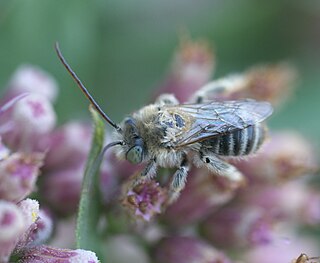
Melissodes is a genus of long-horned bees in the family Apidae. There are 129 described species in Melissodes.

Parancistrocerus fulvipes also known by the common name potter wasp is a species of stinging wasp in the family Vespidae. This species' nesting sites include borings in wood, old mud dauber and Polistes nests, and abandoned burrows of ground-nesting bees, but it may also construct its own burrows in the ground. Prey includes caterpillars of Tortricidae, Nolidae, Chloephorinae, Crambidae, and Gelechiidae.

















